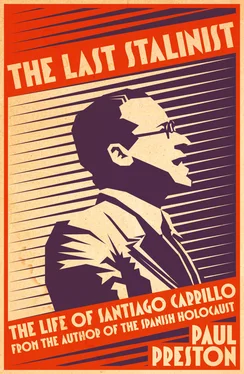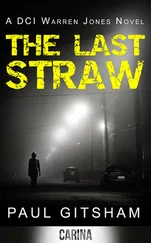Moreover, Carrillo’s post-1974 denials of knowledge of the Paracuellos killings were contradicted by the congratulations heaped on him at the time. Between 5 and 8 March 1937 the PCE celebrated an ‘amplified’ plenary meeting of its Central Committee in Valencia. Such a meeting, with additional invited participants, was midway between a normal meeting and a full Party congress. Francisco Antón, a rising figure in the Party and known to be Pasionaria’s lover, declared: ‘It is difficult to say that the fifth column in Madrid has been annihilated but it certainly has suffered the hardest blows there. This, it must be proclaimed loudly, is thanks to the concern of the Party and the selfless, ceaseless effort of two new comrades, as beloved as if they were veteran militants of our Party, Comrade Carrillo when he was the Consejero de Orden Público and Comrade Cazorla who holds the post now.’ When the applause that greeted these remarks had died down, Carrillo rose and spoke of the work done to ensure that the 60 per cent of the members of the JSU who were fighting at the front could do so ‘in the certain knowledge that the rearguard is safe, cleansed and free of traitors. It is not a crime, it is not a manoeuvre, but a duty to demand such a purge.’ 126
Comments made both at the time and later by Spanish Communists such as Pasionaria and Francisco Antón, by Comintern agents, by Gorev and by others show that prisoners were assumed to be fifth columnists and that Carrillo was to be praised for eliminating them. On 30 July 1937, the Bulgarian Stoyán Mínev, alias ‘Boris Stepanov’, from April 1937 one of the Comintern’s delegates in Spain, wrote indignantly to the head of the Comintern, Giorgi Dimitrov, of the ‘Jesuit and fascist’ Irujo that he had tried to arrest Carrillo simply because he had given ‘the order to shoot several arrested officers of the fascists’. 127In his final post-war report to Stalin, Stepanov wrote proudly that the Communists took note of the implications of Mola’s statement about his five columns and ‘in a couple of days carried out the operations necessary to cleanse Madrid of fifth columnists’. In this report, Stepanov explained how, in July 1937, shortly after becoming Minister of Justice, Manuel Irujo initiated investigations into what had happened at Paracuellos including a judicial inquiry into the role of Carrillo. 128Unfortunately, no trace of this inquiry has survived and it is possible that any evidence was among the papers burned by the Communist-dominated security services before the end of the war. 129
What Carrillo himself said in his broadcast on Unión Radio and what Stepanov wrote in his report to Stalin were echoed years later in the Spanish Communist Party’s official history of its role in the Civil War. Published in Moscow, and commissioned by Carrillo when he became secretary general of the PCE, it declared proudly that ‘Santiago Carrillo and his deputy Cazorla took the measures necessary to maintain order in the rearguard, which was every bit as important as the fighting at the front. In two or three days, a serious blow was delivered against the snipers and fifth columnists.’ 130
Rather unexpectedly, at the meeting of the Junta Delegada de Defensa on 25 December 1936, Carrillo resigned as Consejero de Orden Público and was replaced by his deputy, José Cazorla Maure. He announced that he was leaving to devote himself totally to preparing the forthcoming congress which was intended to seal the unification of the Socialist and Communist youth movements. It was certainly true that a JSU congress was to be held, for which he was preparing an immensely long speech. However, it is very likely that the precipitate timing of his departure was also connected with an incident two days earlier. 131On 23 December, a Communist member of the Junta de Defensa, Pablo Yagüe, had been shot and seriously wounded at an anarchist control post when he was leaving the city on official business. The culprits then took refuge in the local anarchist headquarters, the Ateneo Libertario, of the Ventas district. Carrillo ordered their arrest, but the CNT Comité Regional refused to hand them over to the police. Carrillo then sent in a company of Assault Guards to seize them. At the meeting of the Junta at which this was discussed, he called for them to be shot. 132It was the prelude to a spate of revenge attacks and counter-reprisals. Ultimately, Carrillo failed in his demand for the Junta de Defensa to condemn to death the anarchists responsible for the attack on Yagüe, something which was beyond its jurisdiction. He was furious when the case was put in the hands of a state tribunal where the prosecutor refused to ask for the death penalty on the grounds that Yagüe had not shown his credentials to the CNT militiamen at the checkpoint. 133
Despite the Yagüe crisis, there can be little doubt that Carrillo needed to devote time to the JSU. The organization had expanded massively since July 1936 and its importance in every aspect of the war effort can scarcely be exaggerated. The PCE’s determination to consolidate its control of the JSU could be seen in Carrillo’s role in the national youth conference held in January 1937 in Valencia. It replaced the congress which had initially been scheduled to establish the structure and programme of the new organization. A congress had formal procedures that required the election of representative delegates, and wartime circumstances made that virtually impossible. A conference had the advantage of permitting Carrillo to choose the delegates himself. Thus he was able to pack the proceedings with hand-picked young Communists from the battle fronts and the factories. He then exploited that to perpetrate the sleight of hand whereby the conference made decisions corresponding to a congress. To the astonishment and chagrin of those FJS members who still harboured the illusion that the new organization was ‘Socialist’, the entire event was organized along totally Stalinist lines. All policy directives were pre-packaged, there was virtually no debate and there was no voting. 134
One of the delegates from Alicante, Antonio Escribano, reflected later that ‘Ninety percent of the young Socialists present did not know that Carrillo, Laín, Melchor, Cabello, Aurora Arnaiz, etc had gone over lock, stock and barrel to the Communist Party. We thought that they were still young Socialists and they were acting in agreement with Largo Caballero and the PSOE. If we had known that these deserters had betrayed us, something else would have happened.’ 135The impression that the proceedings were carried out under the auspices of Largo Caballero was shamelessly given by Carrillo, who declared, ‘It is necessary to say that Comrade Largo Caballero has, as ever, or more than ever, the support of the Spanish youth fighting at the front and working in the factories. It is necessary to say here that Comrade Largo Caballero is for us the same as before: the man who helped our unification, the man from whom we expect much excellent advice so that, in defence of the common cause, the unity of Spanish youth may be a reality.’ 136
As newsreel footage revealed, apart from Julio Álvarez del Vayo and Antonio Machado, the poet and alcalde (mayor) of Valencia, the stage party was made up of Communists headed by Pasionaria, Dolores Ibárruri. Carrillo opened his long speech with thanks to the Communist Youth International, the KIM, for its support. He made especially fulsome reference to the KIM representative, Mihály Farkas, introduced as ‘Michael Wolf’, with whom his relationship was growing closer. No longer the revolutionary firebrand of the Cárcel Modelo, Carrillo explained that, while the Socialist Youth, the FJS, had tried to undermine the government in 1934, now the JSU supported the Republican government’s war effort. According to Carrillo’s close collaborator Fernando Claudín, Farkas/Wolf had considerable input into Carrillo’s speech. Thus the Comintern line was paramount in Carrillo’s talk of broad national unity against a foreign invader. Central to his rhetoric was the defence of the smallholding peasants and the small businessmen with some bitter criticisms of anarchist collectives. There was also the ritual denunciation of the POUM (the Partido Obrero de Unificación Marxista) as a subversive Trotskyist outfit. With the guidance of Codovila and Farkas/Wolf, Carrillo had already started down the road of linking the POUM to the Francoists. The primary function of the JSU was no longer the fomenting of revolution but the education of the masses – the basic reformist aspiration of the Republican–Socialist coalition for which he had previously excoriated Prieto and the PSOE centrists. This was Comintern policy, although it also made perfect sense in the wartime context. 137
Читать дальше












